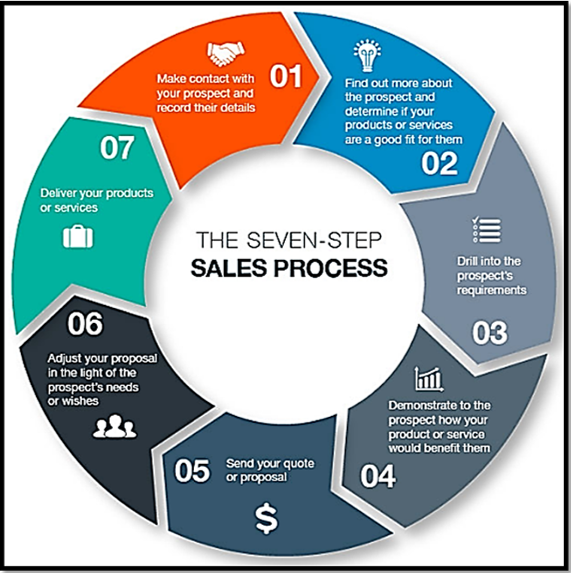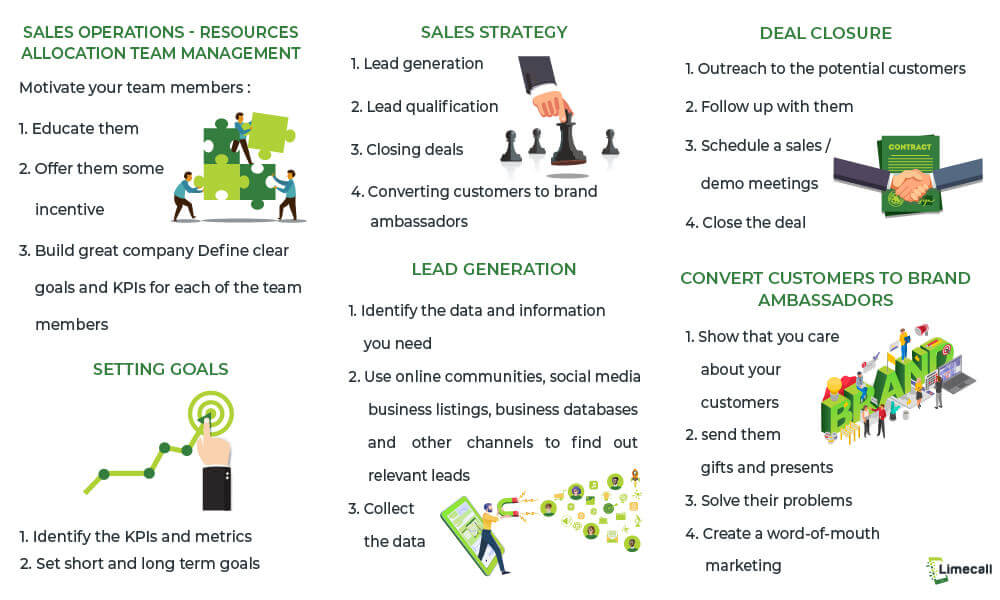To succeed in a sales management position, you need to develop a winning sales management process. But how? If you’ve just accepted a leadership role within your organization, you’re probably feeling a bit overwhelmed with all your new duties.
Keep reading to learn what a sales management process is, why they’re so beneficial, and how to implement one for your organization immediately.
What is a Sales Management Process?
A sales management process is any process used by a company’s sales team to hire new sales reps, coordinate sales operations, and improve sales strategies. Sales management processes are implemented with the goal of meeting (or exceeding!) sales targets.
To better illustrate what a sales management process is, let’s look at a couple of hypothetical scenarios. Below, you’ll see examples of two companies: Company A that has an effective sales management process in place, and Company B that does not.

Company A
Company A is a successful organization that sells various widgets to manufacturing companies in Phoenix, AZ. It’s sales team is led by a professional who really appreciates and prioritizes sales management.
Because of this, Company A’s sales manager has implemented an extensive onboarding program for new sales reps that includes in-depth training. After new sellers complete their training, they know everything they need to know about selling Company A’s products.
But this sales manager’s sales management process doesn’t stop after onboarding. She takes the time, each and every week to check in with her sales team, make sure they have the resources they need to sell at a high level, and are enjoying their jobs.
She then takes what she gleans from her sales reps to properly assign territories, remove outdated sales strategies, and improve sales targets.
Company B
Company B also sells widgets to manufacturing companies in the greater Phoenix area. In fact, it’s a direct competitor to Company A. But unfortunately, Company B doesn’t appreciate sales management the way it should and suffers the consequences as a result.
First, Company B doesn’t have a dedicated sales manager. The sales team is led by the organization’s CEO, who doesn’t have any experience in selling situations. This leads to bad hires, because Mr. CEO doesn’t know what qualities to look for in a top-notch salesperson.
But Company B’s fearless leader doesn’t even realize his mistake. He’s so busy trying to run the company, he can’t give the sales department his full attention. The result is unhappy employees who can’t properly do their jobs, slumping sales numbers, and revenue projections that leave a lot to be desired.
The Benefits of an Effective Sales Management Process
Obviously, you want to be like Company A. But instead of asking you to simply believe us when we say that an effective sales management process will lead to organizational success, we’ll show you why this is the case.

Sales management is important because it leads to the following benefits:
Higher Conversion Rates
A finely tuned sales management process will give you complete visibility into your team’s sales efforts and allow you to see what’s working and what isn’t. In fact, fixing a faulty process can result in a 17% increase in sales!
When you understand which strategies and tactics prove most successful in moving prospects through the pipeline, you can ensure your team takes more of those actions on a regular basis — or eliminates them from their selling repertoires. Doing so will naturally improve conversion rates across your entire sales team.
Better Leads
Another way to improve conversion rates is to only spend time selling to quality leads, i.e. leads that have a high likelihood of making a purchase.
Because sales management processes allow for complete visibility (as mentioned above), you can analyze your current customers, identify the qualities that all repeat buyers have, and then weed out poor fit leads that don’t match your ideal customer profile
Faster Sales Cycles
Since an effective sales management process will help your company better identify quality leads, your sales team won’t have to spend as much time selling to low-grade prospects, which means sales cycles will automatically become faster.
Additionally, your team will always know what steps to take at each stage of the sales process, enabling them to achieve peak efficiency in the field and shorten close times.
Accurate Sales Forecasting
A study from the TAS Group found that a defined sales management process leads to accurate sales forecasts 70% of the time, which makes sense. Knowing exactly where your leads are in the pipeline will also allow you to accurately predict future sales.
Additionally, a good sales management process will give you access to data that you can use to create repeatable steps that yield consistent outcomes. It’s much easier to predict win rates and set realistic quotas when you have cold, hard data to back up your choices.
Improved Team Morale
Your sellers want to know what to expect from your organization. They also want to be placed in situations where they can succeed. An effective sales management process will enable you to provide both of these things to your team.
Think about it, when sellers know which steps to take to close deals and feel confident in their abilities, they’ll naturally achieve greater success and be happier.
Moreover, your team will feel unified in their efforts as each member works towards the same goals. Unification will lead to higher levels of motivation, better company culture, and strong bonds of trust between you and your employees.
4 Steps to Build a Winning Sales Management Process
An effective sales management process is undeniably beneficial. But the question is, how do you build one for your organization? Simple: follow the four-step process outlined below:
1. Hire the Right Sales Reps
Effective sales management starts with proper hiring and onboarding. Without quality employees, you’ll have an extremely difficult time hitting sales targets.
When hiring new sellers for your team, make sure that each has the required skill sets they’ll need to be successful. But don’t stop there! You should also look for cultural fit. Will the candidate you’re considering mesh with your current team? It’s important to assess a potential sales rep’s personality and whether their make-up is right for your organization.
Once you’ve hired a new employee, you need to onboard them so that they can become meaningful contributors as quickly as possible. Make sure you set clear expectations, properly train, and distribute necessary resources to new reps during this stage.
Onboarding is an often overlooked step in the sales management process, but it shouldn’t be. According to DePaul University, roughly 26% of sales staff turns over annually. As each departing employee costs companies $100k, keeping team members happy is paramount, which proper onboarding will allow you to do.
2. Design an Effective Sales Process
Research by the Sales Management Association suggests that 90% of all high-performing companies use a formal, guided sales process. Need we say more?
A proper sales process will define the steps and sales strategies your sellers should use at each stage of the funnel. The trick is building a process that yields consistent results. To do this, we recommend the following:
- Assess Your Current Sales Approach: Before you can design a complete sales process, you need to evaluate your current approach. What does your pipeline look like at this exact moment? How does your team find and qualify new leads? Answer these and similar questions, then move on to the next step.
- Identify Winning Strategies and Tactics: After assessing your current sales approach, you should have a good idea of what works and what doesn’t. Add the winning strategies and tactics to your sales process and cut the rest. Make sure you do this for each stage of your funnel so your reps always know which steps to take!
- Optimize For Greater Future Success: We suggest keeping an eye on your sales process at all times — especially in the beginning. That way you can evaluate its effectiveness and make necessary changes as needed. Remember, your sales process should continually evolve as your customers’ needs change.
Once you’ve created a repeatable sales process, you can begin to forecast sales with much great accuracy. Let’s talk more about that…
3. Forecast Future Sales
Accurate sales forecasting is essential to the success of your organization. Why? Because it will allow you to see potential problems before they become huge issues, track your reps’ progress towards quota, and make better company decisions regarding revenue.
Fortunately, accurately forecasting sales is much easier to do once you implemented an effective sales process, as we mentioned above. This is because a sales process will help you understand your leads’ place in your sales pipeline, how many steps away they are from a sale, and how long each step will take your reps to complete.
4. Measure Your Efforts
Finally, we recommend measuring your team’s efforts on a regular basis to see if the sales process you’ve put in place is effective. To do this, define key metrics to monitor such as number of leads generated and average conversion rate for each team member.
With these details, you can make informed decisions regarding your sales process. Is your team properly trained? Are they targeting the right prospects? Have you implemented outdated strategies? Measure your efforts and you’ll know.
While consistent measurement may seem like a herculean task, the right technology tools can actually make it a simple and productive process.

Enhance Your Sales Management Process With SPOTIO
SPOTIO gives sales leaders everything they need to implement and monitor an effective sales management process after they’ve hired the right team members. For example, with SPOTIO you can:
- Understand Your Ideal Customers: What industries do your products sell best in? Which email templates generate the most responses? What territories produce the best customers? SPOTIO logs all crucial data points and makes them easily accessible to sales managers.
- View Sales Rep Activity: It’s difficult to know which strategies and tactics in your sales process are effective if you can’t monitor sales rep activity. Use SPOTIO to learn what your field reps are doing so that you can help them plan more productive routes and otherwise coach them to greater success.
- Analyze Important Metrics: SPOTIO will also give you the data you need to make better decisions regarding your sales team. Are they contacting quality leads? Are they overusing a specific form of communication? Do their conversion rates meet industry standards? SPOTIO can generate reports to answer these questions and save the information inside our CRM tool built specifically for field sales.
SPOTIO is the ultimate tool for sales managers and their reps. Request a free demo of our software today to see if it’s the right tool for you and your team.


